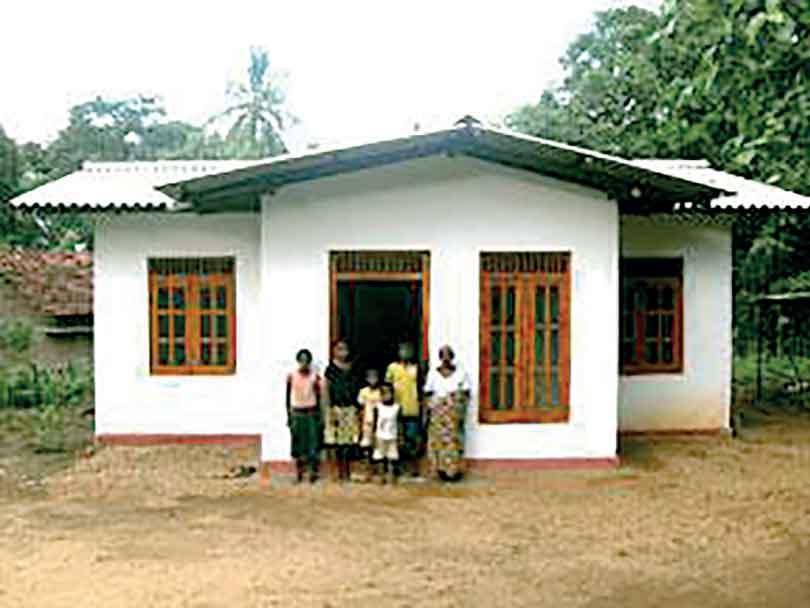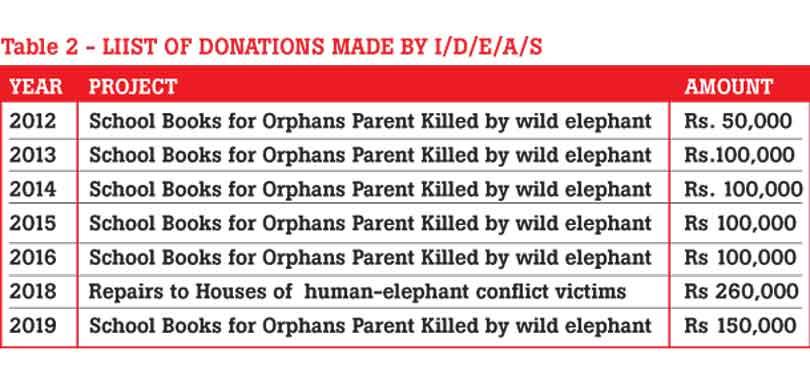10 Aug 2021 - {{hitsCtrl.values.hits}}

A new house built by the Biodiversity and Elephant Conservation Trust
 Many lives, both human and elephant, are lost as a result of the human-elephant conflicts that are prevalent in most parts of Sri Lanka. The number of victims (on both sides) and the intensity of occurrences has been increasing over the past few years as the Table below clearly depicts.
Many lives, both human and elephant, are lost as a result of the human-elephant conflicts that are prevalent in most parts of Sri Lanka. The number of victims (on both sides) and the intensity of occurrences has been increasing over the past few years as the Table below clearly depicts.

Typically, when an elephant is killed, the carcass is buried or burnt. No further thought is given to the effect that the death of this elephant has on the herd it belonged to.
 However, if a human is killed by an elephant there is an immediate effect on the family of the deceased. There is a pall of grief that descends on the family and friends of the victim. With time this grief is reduced in intensity. If, on the other hand, the victim was the breadwinner, there is an immediate change in the economic position of the family. A source of income, in many instances the only source, is cut off. As a result of this loss, the bereaved family is forced to make many changes to its life style. Adjustments have to be made with regard to food, schooling, clothing, plans for the construction of a house etc. Life for that family will never be the same again. The attitudes of most children of the victims undergo many changes after the death of the parent.
However, if a human is killed by an elephant there is an immediate effect on the family of the deceased. There is a pall of grief that descends on the family and friends of the victim. With time this grief is reduced in intensity. If, on the other hand, the victim was the breadwinner, there is an immediate change in the economic position of the family. A source of income, in many instances the only source, is cut off. As a result of this loss, the bereaved family is forced to make many changes to its life style. Adjustments have to be made with regard to food, schooling, clothing, plans for the construction of a house etc. Life for that family will never be the same again. The attitudes of most children of the victims undergo many changes after the death of the parent.
The majority of those killed by elephants are men. The surviving parent, the mother in most of the cases, attempts to maintain the family’s economic status as far as possible and see to the education of the children. This is not an easy task. Some wives of victims of elephant attacks have found employment in the Middle East. Though the children are deprived of the presence and love of either parent, they are financially stable because of the money that is sent for them. This at least ensures the children of some security. But some families do not have proper income after the loss of the breadwinner. There are also instances where the children have been left in the care of an aunt or uncle.

The Biodiversity and Elephant Conservation Trust (BECT), realised the need for not only conserving the elephants and the biodiversity in Sri Lanka, but also supporting the education of the children of those who have been killed by wild elephants. BECT therefore launched a School Book Donation Project to enable the children of victims of the human-elephant conflict to attend school.
Initially, BECT identified 74 families where one parent had been killed by a wild elephant. It has assisted 134 children from amongst these families, with the donation of schoolbooks, sufficient for one year. This has been done for the last twelve years. The total number of beneficiaries from this project is around 370 children. We have also assisted in the construction of a house for families in need of a dwelling.
 The School Book Donation Project enables the affected children to continue attending school. This is an opportunity they would not have had, otherwise, due to the lack of school books. Five of these children have entered Universities and three of them have graduated, one of whom is now working as a lawyer. In addition, another seventeen children have obtained employment as various Government officers after their A/Level examinations. These are some of our greatest achievements over the last twelve years.
The School Book Donation Project enables the affected children to continue attending school. This is an opportunity they would not have had, otherwise, due to the lack of school books. Five of these children have entered Universities and three of them have graduated, one of whom is now working as a lawyer. In addition, another seventeen children have obtained employment as various Government officers after their A/Level examinations. These are some of our greatest achievements over the last twelve years.
In addition, BECT has been conducting, for the last 20 years, a Schools Awareness Program in schools in areas where there are human-wildlife conflicts It also carries out various research projects related to human elephant conflict mitigation.
A deeper national development problem
Nanda Abeywickrama, Chairman of Initiatives in Development of Entrepreneur Approaches and Strategies (IDEAS) commented that the aforementioned organization IDEAS has stepped into collaborate with BECT to assist in their relief efforts through annual donations over the past several years, starting 2012. A list of the generous donations made is given below.

Although the table looks like a routine exercise, it is really not so. Since IDEAS has limited funds and has to prioritize its grants, IDEAS Council evaluates each request against competing requests received from many quarters. Nevertheless, IDEAS has appreciated both the environmental concerns of HEC as well as the misery caused to the human victim families and developed a partnership with BECT to assist it on a priority basis. Each request from BECT is carefully scrutinized for the incident, the location and the living standards of the victims and their felt needs.
Abeywickrama is of the view that HEC is the manifestation of a much deeper national development problem that needs to be addressed by higher authorities to minimize the competition between humans and animals for scarce natural resources through long term strategic development policies.
In the interim, IDEAS as an organization, while celebrating its silver jubilee this year, is quite pleased to have collaborated with BECT in the knowledge that its scarce resources are put to good use especially in assisting orphaned children to get through their basic education.
The logistics involved in identifying such families, visiting and screening them are painstaking and tedious. Further follow up is needed to ensure that the grants are utilised productively. IDEAS is convinced that the writer and his team of volunteers is discharging this responsibility effectively which is a cause for comfort for IDEAS to find that its funds raised with considerable effort are utilized for a worthy cause.
IDEAS Chairman, also points out that the organisation has supported many similar deserving causes over the past 20 years in tandem with its signature programme of assisting small and micro level entrepreneurs as a springboard to creating interest in cottage level industries in rural Sri Lanka.
(The writer is a member of a volunteer group called Initiatives in Development of Entrepreneur Approaches and Strategies. Its main focus is on helping chosen small time entrepreneurs to develop and upgrade their businesses to a more successful level. To this end, these entrepreneurs are given interest-free loans cum grants, as decided by its Council. A member of IDEAS is also appointed to mentor and monitor each entrepreneur.
IDEAS also has a Community Empowerment stream through which small outright grants are extended to highly deserving community initiatives, such as BECT. The writer is also the Managing Trustee, BECT and he can be reached on 0777 895770 or via E-mail at [email protected] )
21 Dec 2024 2 hours ago
21 Dec 2024 7 hours ago
21 Dec 2024 9 hours ago
21 Dec 2024 21 Dec 2024
21 Dec 2024 21 Dec 2024